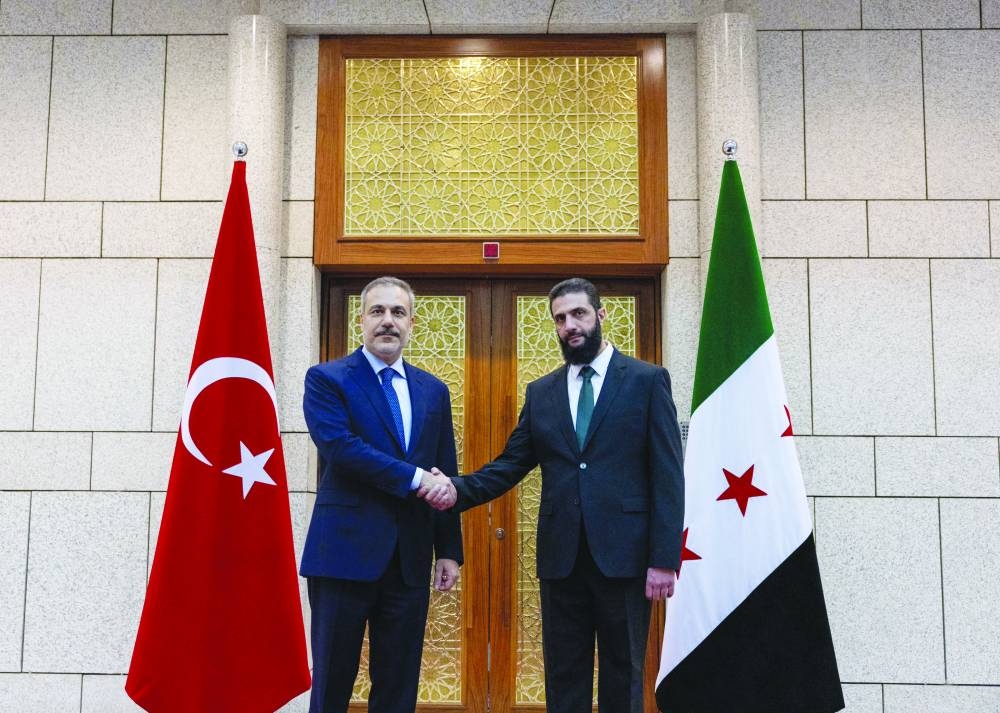Two weeks after seizing power in a sweeping offensive, Syria’s new leader Ahmed al-Sharaa yesterday said weapons in the country, including those held by Kurdish-led forces, would come under state control.
Sharaa spoke alongside Turkish Foreign Minister Hakan Fidan, after earlier meeting with Lebanese Druze leaders and vowing to end “negative interference” in the neighbouring country.
Ankara-backed rebels played a key role in supporting Sharaa’s Hayat Tahrir al-Sham (HTS) group, which headed a rebel alliance and seized Damascus on December 8, ousting long-time ruler Bashar al-Assad.
During a press conference with Fidan, Sharaa said Syria’s armed “factions will begin to announce their dissolution and enter” the army.
“We will absolutely not allow there to be weapons in the country outside state control, whether from the revolutionary factions or the factions present in the SDF area,” he added, referring to the Kurdish-led Syrian Democratic Forces.
Sharaa — also known as Abu Mohammed al-Jolani — had traded in the olive-green military shirt he sported just days ago for a suit and tie during his meetings yesterday at the presidential palace.
He also said: “We are working on protecting sects and minorities from any attacks that occur between them” and from ‘external’ actors exploiting the situation “to cause sectarian discord.”
“Syria is a country for all and we can coexist together,” he added. Fidan said sanctions on Syria must “be lifted as soon as possible”. He called for the international community to “mobilise to help Syria get back on its feet and for the displaced people to return”. Syria’s nearly 14-year civil war killed more than half a million people and displaced more than half its population, many of them fleeing to neighbouring countries, including 3mn in Turkiye.
Turkiye has maintained strong ties with Syria’s new leaders, and Ankara’s intelligence chief Ibrahim Kalin was in Damascus just four days after Assad fell.
Ankara has meanwhile continued operations against Kurdish-held areas in northeastern Syria, with a Britain-based war monitor reporting on Saturday that a Turkish drone strike killed five civilians in the area.
Ankara regards the People’s Protection Units (YPG), the main component of the SDF, as being linked to the militant Kurdistan Workers’ Party (PKK) at home, which both Turkiye and Western allies deem a “terrorist” organisation.
‘RESPECT LEBANON’S SOVEREIGNTY’
Regional powerhouse Saudi Arabia is also in direct contact with Syria’s new authorities. Riyadh will send a delegation to the country soon, Syria’s ambassador in the Saudi capital said.
During his meeting with visiting Lebanese Druze chiefs Walid and Taymur Jumblatt, Sharaa said Syria will no longer exert “negative interference in Lebanon at all”.
He added that Damascus “respects Lebanon’s sovereignty, the unity of its territories, the independence of its decisions and its security stability”.
Syria “will stay at equal distance from all” in Lebanon, Sharaa added, acknowledging that Syria has been a “source of fear and anxiety” for the country.
Walid Jumblatt, long a fierce critic of Assad and his father Hafez who ruled Syria before him, arrived in Damascus yesterday at the head of a delegation of lawmakers from his parliamentary bloc and Druze religious figures.
The Druze religious minority is spread across Lebanon, Syria and Israel. Walid Jumblatt accuses the former Syrian authorities of having assassinated his father in 1977 during Lebanon’s civil war.

Turkiye’s Foreign Minister Hakan Fidan meets with Syria’s de facto leader Ahmed al-Sharaa in Damascus, yesterday.
